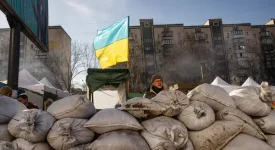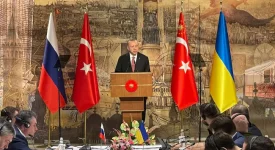Turkey’s elections on 24 June ushered in a new constitutional order with significant ramifications for the country’s international role. Recep Tayyip Erdogan became Turkey’s first popularly elected executive president with 53 percent of the national vote. Now that the office of the prime minister has vanished, the president had been entrusted with executive authority. He will enjoy a range of unalloyed executive prerogatives with full and exclusive responsibility for policymaking whereby he will also be responsible for the conduct of foreign policy as well.
In addition to this structural transformation, Turkish foreign policy will also be affected by another electoral consequence: The ruling Justice and Development Party (AKP) lost its outright parliamentary majority. Even with its diminished role under the new constitution, the control of parliament is critical for the effective functioning of the political system. The AKP’s new ally in parliament will be its elections partner, the ultranationalist National Movement Party (MHP). The MHP’s deep suspicion of internationalism is bolstered by a siege mentality that regards Turkey’s national interests as being constantly under threat by foreign actors.
Unlike the AKP, which traces its roots to political Islam and essentially views the West as the ideological other, the MHP vision is less discriminatory. It nurtures an equal disdain for all foreigners. Thus, Erdogan’s necessary partnership with the MHP will therefore open Turkish foreign policy to the influence of the party’s ideology, with significant consequences for Turkey’s relations with its global and regional partners. An alliance with the MHP will also severely constrain Erdogan’s room for maneuver on the Kurdish issue, as a security-driven outlook will crowd out options for a political settlement.
Turkey’s relationship with Europe will become more complicated, too. Progress with the EU is now conditioned on democratic reform and the full restoration of the rule of law. The most recent EU statement on Turkey, issued on 26 June, extended this conditionality beyond the framework of the accession talks to the start of a new round of trade negotiations. Visa liberalization for Turkish citizens visiting the EU will also continue to be delayed as Turkey will very likely continue to resist changes to its anti-terrorism legislation, which has suppressed freedom of expression in the country.
The MHP is deeply skeptical of Turkey’s European Union membership drive. During the election campaign, the MHP leadership even called for an end to these aspirations. Even if the Erdogan government is not necessarily intent on ending EU accession talks, it will nonetheless be hamstrung by the lack of resolve and support for any large-scale democratic reform agenda by its chosen partners in parliament. Under these circumstances, Turkish-EU relations could become purely transactional, covering only a few areas of mutual interest such as the refugee deal – whereby, in return for the EU’s financial assistance, Turkey commits itself to keeping the more than 3.5 million Syrian refugees on its territory from moving across EU borders.
The cost of complete alienation from the West would be prohibitive for a Turkish economy that is heavily reliant on international funding to the tune of $250 billion a year. Turkey’s growth is also intimately linked to access to Western markets and inflows of foreign direct investment and technology. So, in many ways, the legacy of past generations of Turkish leaders who consciously chose to advance Turkey’s economic integration with the West may yet prove the strongest factor keeping the country anchored to the West despite a darkening political outlook.
Ultimately Turkey’s future ties with the United States and Europe will depend on whether the MHP leadership prefers to use its political leverage to achieve domestic or foreign-policy objectives. It will also depend on how Erdogan chooses to satisfy the MHP’s political aspirations. This unstable equilibrium, caused by the nascent internal struggle for power between Erdogan and the MHP leadership, will determine the future direction of Turkey’s foreign policy.
‘Turkey’s Foreign Policy Is About to Take a Turn to the Right’ – Op-Ed by Sinan Ülgen – Carnegie Europe.







